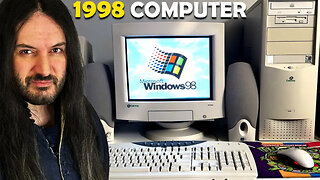Premium Only Content

#329 Chemical Processing and Separation
Chemical processing and separation are essential techniques in the field of chemistry and various industries. They involve the manipulation and isolation of substances based on their chemical and physical properties. Here's an overview of these concepts:
Chemical Processing:Chemical processing refers to a series of operations used to transform raw materials or chemicals into desired products. It encompasses various chemical reactions and unit operations. Key aspects of chemical processing include:Chemical Reactions: This involves the conversion of one or more chemicals into different chemicals through processes like synthesis, decomposition, or modification of molecular structures.
Unit Operations: These are individual steps or operations in a chemical process. Examples include mixing, distillation, crystallization, filtration, and extraction.
Batch vs. Continuous Processes: Chemical processes can be carried out in batch mode (sequential operations in a single vessel) or continuously (constant flow of reactants and products).
Separation Techniques:Separation techniques are used to isolate specific components or substances from mixtures based on their properties. Some common separation methods include:Distillation: This process separates components of a mixture based on differences in their boiling points. It's often used for purifying liquids or separating volatile compounds.
Filtration: Filtration separates solid particles from a liquid or gas by passing the mixture through a porous medium (filter) that allows the liquid or gas to pass through while retaining the solid.
Extraction: Extraction involves the transfer of a solute from one phase (usually a liquid) to another phase using a suitable solvent. It's commonly used to extract valuable compounds from plant materials in industries like pharmaceuticals or flavorings.
Chromatography: Chromatography techniques separate components of a mixture based on their differential affinities for a stationary phase and a mobile phase. Common types include gas chromatography (GC) and liquid chromatography (LC).
Crystallization: Crystallization is the process of forming solid crystals from a solution or a melt. It's used to purify substances and separate them from impurities.
Electrophoresis: Electrophoresis separates charged molecules (typically proteins or nucleic acids) based on their mobility in an electric field. It's commonly used in biochemistry and molecular biology.
Centrifugation: Centrifugation uses centrifugal force to separate components in a mixture by density. It's widely used in laboratories and industrial processes.
These techniques play a crucial role in various industries, including chemical manufacturing, pharmaceuticals, food processing, petrochemicals, and environmental engineering. The choice of the most suitable separation method depends on the specific properties of the substances involved and the desired outcome.
www.antharas.co.uk/ companies website or top book distributors!
-
 8:44
8:44
AV
1 year ago#1142 Press release - Guide to innovationin the NHS
13 -
 48:48
48:48
The Culture War with Tim Pool
29 minutes agoThe West Is COLLAPSING Under Mass Migration | The Culture War's Across The Pond
4 -
 LIVE
LIVE
Badlands Media
10 hours agoBadlands Daily – Nov. 28, 2025
6,431 watching -
 LIVE
LIVE
Robert Gouveia
52 minutes agoAmerican Soldier DEAD! Trump Furious! Afghan 'Vetted by CIA'! Third World FREEZE!
652 watching -
 LIVE
LIVE
Nikko Ortiz
1 hour agoVR Ghost Of Tabor... | Rumble LIVE
204 watching -
 19:08
19:08
ThinkStory
3 hours agoSTRANGER THINGS SEASON 5 Volume 1 Ending Explained, Theories, & Details You Missed!
1.76K1 -
 LIVE
LIVE
Viss
1 hour ago🔴LIVE - Pushing Every Raid To It's Absolute Limit! - Arc Raiders
202 watching -
 16:48
16:48
MetatronGaming
5 days agoI bought a 1998 Vintage Computer and turned it on after 27 years!
2584 -
 LIVE
LIVE
This is the Ray Gaming
51 minutes agoHappy Black Fri-RAY | Rumble Premium Creator
137 watching -
 1:03:47
1:03:47
The Mike Schwartz Show
14 hours agoTHE MIKE SCHWARTZ SHOW with DR. MICHAEL J SCHWARTZ 11-28-2025
4.01K4